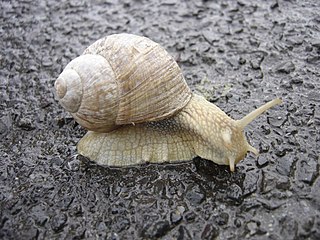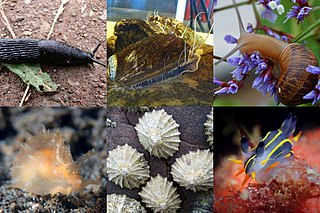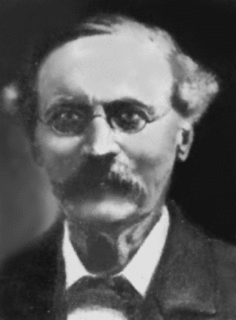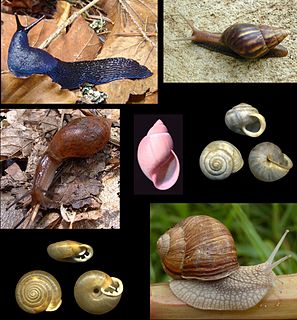
A snail is, in loose terms, a shelled gastropod. The name is most often applied to land snails, terrestrial pulmonate gastropod molluscs. However, the common name snail is also used for most of the members of the molluscan class Gastropoda that have a coiled shell that is large enough for the animal to retract completely into. When the word "snail" is used in this most general sense, it includes not just land snails but also numerous species of sea snails and freshwater snails. Gastropods that naturally lack a shell, or have only an internal shell, are mostly called slugs, and land snails that have only a very small shell are often called semi-slugs.

A seashell or sea shell, also known simply as a shell, is a hard, protective outer layer usually created by an animal that lives in the sea. The shell is part of the body of the animal. Empty seashells are often found washed up on beaches by beachcombers. The shells are empty because the animal has died and the soft parts have been eaten by another animal or have decomposed.

The gastropods, commonly known as snails and slugs, belong to a large taxonomic class of invertebrates within the phylum Mollusca called Gastropoda.

Neogastropoda is a clade of sea snails, both freshwater and marine gastropod molluscs.

Heterobranchia, the heterobranchs, is a taxonomic clade of snails and slugs, which includes marine, aquatic and terrestrial gastropod mollusks.

A siphon is an anatomical structure which is part of the body of aquatic molluscs in three classes: Gastropoda, Bivalvia and Cephalopoda.

The operculum, meaning little lid, is a corneous or calcareous anatomical structure like a trapdoor which exists in many groups of sea snails and freshwater snails, and also in a few groups of land snails; the structure is found in some marine and freshwater gastropods, and in a minority of terrestrial gastropods, including the families Helicinidae, Cyclophoridae, Aciculidae, Maizaniidae, Pomatiidae, etc.

Captain Frederick Wollaston Hutton was an English-New Zealand scientist who applied the theory of natural selection to explain the origins and nature of the natural history of New Zealand. An army officer in early life, he then had an academic career in geology and biology. He became one of the most able and prolific nineteenth century naturalists of New Zealand.

Sea snail is a common name for slow-moving marine gastropod molluscs, usually with visible external shells, such as whelk or abalone. They share the taxonomic class Gastropoda with slugs, which are distinguished from snails primarily by the absence of a visible shell.

Cypraeoidea, the cowries and cowry allies, is a superfamily of sea snails, marine gastropods included in the clade Littorinimorpha. This superfamily had been called Cypraeacea and was named by Rafinesque in 1815.

Sigmurethra is a taxonomic category of air-breathing land snails and slugs, terrestrial pulmonate gastropod molluscs. This is an informal group which includes most land snails and slugs.

Freshwater snails are gastropod mollusks which live in fresh water. There are many different families. They are found throughout the world in various habitats, ranging from ephemeral pools to the largest lakes, and from small seeps and springs to major rivers. The great majority of freshwater gastropods have a shell, with very few exceptions. Some groups of snails that live in freshwater respire using gills, whereas other groups need to reach the surface to breathe air. In addition, some are amphibious and have both gills and a lung. Most feed on algae, but many are detritivores and some are filter feeders.

In the shell of gastropod mollusks, the lip is the free margin of the peristome or aperture of the gastropod shell.

Terrestrial molluscs or land molluscs (mollusks) are an ecological group that includes all molluscs that live on land in contrast to freshwater and marine molluscs.
Metaconulus is an extinct genus of sea snails, marine gastropod mollusks, in the family Calliostomatidae within the superfamily Trochoidea, the top snails, turban snails and their allies.
Maurea delli is a species of sea snail, a marine gastropod mollusk, in the family Calliostomatidae within the superfamily Trochoidea, the top snails, turban snails and their allies.
Metaconulus brasili is an extinct species of sea snail, a marine gastropod mollusk, in the family Calliostomatidae within the superfamily Trochoidea, the top snails, turban snails and their allies.
Metaconulus mauliaensis is an extinct species of sea snail, a marine gastropod mollusk, in the family Calliostomatidae within the superfamily Trochoidea, the top snails, turban snails and their allies.













